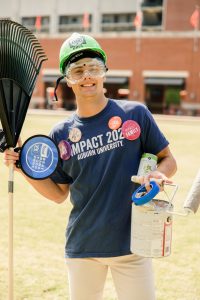By Chloe McMahon
 In the Office of Student Involvement, the Service Programs branch has established itself as a vital part of student life. With their commitment to learning by doing, Service Programs at Auburn allows students to engage in meaningful service that can have an impact on their local, national, and even international community.
In the Office of Student Involvement, the Service Programs branch has established itself as a vital part of student life. With their commitment to learning by doing, Service Programs at Auburn allows students to engage in meaningful service that can have an impact on their local, national, and even international community.
There are several different programs that students can become involved in: The Big Event, Beat Bama Food Drive, IMPACT, and Alternative Student Breaks are just a few of the programs that Auburn students have made thrive throughout the years. These organizations not only provide students with service opportunities; they also give students the wheel and let them lead. Charlotte Brown, Coordinator for Service Programs, described it as “leadership at all levels,” allowing students to practice leadership through a variety of formal and informal channels. Service Program organizations all have positions such as director, assistant director, and an executive board comprised of students. These positions have varying levels of time commitment and responsibilities. For many students, the opportunity to work within these positions is enticing, because many students enjoy being able to have a greater say in how the organization is run, both through shaping the vision and managing the logistics. If students do not feel they have the capacity to take on one of the primary leadership roles, however, Brown contends that every volunteer is able to improve upon their leadership skills simply through showing up and taking initiative in their various projects. Brown cites Alternative Student Breaks as a central program that teaches all participants leadership. “Typically,” Brown says, “[students] are in other communities with the goal of bringing back what they learn to practice active citizenship in their own communities.”
Brown intentionally creates the space for students to lead by becoming a soundboard, of sorts, upon which students can use to develop their ideas and vision for service organizations. Brown asks questions, educates them of the resources they have available, and helps them understand the potential risks and hang-ups in any project. In this way, she is an advisor in the truest sense, aiming to equip students with what they need to succeed.
This model of student leadership is evidently very effective: Auburn’s Student Programs have created a sustainable model that allows them to continue serving their target communities even as central student leaders graduate and leave campus. One of the ways these programs maintain their effectiveness even as student leaders leave is through forming healthy, mutual partnerships with the communities they serve. Student leaders for The Big Event, which is a yearly day of service, maintain communication with their partner communities throughout the year, listening to their needs so that they can locate them with resources and better cater their yearly service to the communities most pressing needs. IMPACT, Brown says, relies most heavily on this mutualistic community-organization bond. IMPACT works at several different locations, providing institutions in the community with services that range anywhere from assistance at daycare to the maintenance of popular hiking trails. Through listening to the community, IMPACT ensures their service efforts are a response to the communities’ needs and not the students’ best idea of what they may need.
Students interested in participating in student service can access new opportunities through following Auburn Gives Back on social media platforms, as well as by visiting the online platform givepulse, which is a cache of different volunteer opportunities for students, as well as a database where students can log the hours they have engaged in service. Overall, Service Programs hopes that through their programs, students can engage in meaningful service while developing leadership skills they can take with them when they leave Auburn, creating engaged citizens throughout the globe.
Post contributed by Chloe McMahon, Program Coordinator, Office of Sustainability.




